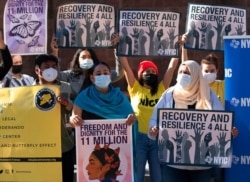Washington’s immigration policy will focus on regional migration and its root causes, as well as the annulment of policies inherited from the Trump administration, according to White House officials.
President Joe Biden will make the announcement Tuesday, Press Secretary Jen Psaki said during a daily briefing this week.
Representatives of the governments of Honduras, El Salvador and Guatemala envision more U.S. attention toward the region during the Biden administration and plan to support a common development agenda based on "mutual respect."
President Biden told his Mexican counterpart, Andres Manuel Lopez Obrador, that Washington will address the containment of the irregular flow of migrants to Mexico and the United States, in part, through promoting economic development in Central America.
Honduran President Juan Orlando Hernández told VOA that approach represents an “opportunity to retake” what the Obama administration was working on.
Guatemalan Foreign Minister Pedro Brolo told VOA that both countries have a “common agenda” beyond economic opportunities, including fighting increased organized crime and drug trafficking, and he plans to bring those issues to the table in future meetings.
Cooperation and mutual respect
Ariel Ruíz Soto, an analyst at the Migration Policy Institute in Washington, said U.S. investment in the region is not enough.
The Northern Triangle countries need to show they are committed to solve the root causes of the immigration, including poverty and corruption, Ruiz Soto said. Bipartisan support in the U.S. Congress is also necessary to enact immigration reform, he added.
“The relationship has to change its tone. It is necessary to reopen the dialogue with Central America in order to once again have cooperation, not pressure,” Ruíz Soto told VOA.
Biden promised during his presidential campaign to allocate $4 billion to the Central American region and attack the issues that cause migration, including “endemic corruption,” poverty and economic insecurity.
Brolo indicated the three countries that make up the Northern Triangle will be more "attractive for foreign investment" to repair economies hard hit by the COVID-19 pandemic and last year’s natural disasters, including back-to-back hurricanes Eta and Iota.
“Our people would tend to migrate less, since they would have jobs," he explained.
A closed-door policy at the border
The changes that the White House plans to implement do not represent an open border policy, said Brendan O’Brien, the United States charge d'affaires in El Salvador.
"Migrants who cross the border irregularly will be returned, in accordance with legal procedures that guarantee their safety," O'Brien said in a joint statement with the foreign minister of El Salvador.
Both Brolo of Guatemala and the Honduran ambassador to the United States, Luis Fernando Suazo, said their governments are focused on discouraging the caravans to the north.
"We are not going to allow irregular, disorderly and unsafe traffic," Brolo said, while Suazo indicated his government is investigating the organization of caravans that "are not spontaneous."
The administration of former President Donald Trump put in place a zero-tolerance policy that was rescinded Tuesday by the Justice Department.
Several human rights organizations and President Biden denounced the separation of hundreds of children from their parents as part of Trump’s policy. The new president's actions include the creation of a task force to reunify the families of at least 600 children who were separated from their parents at the U.S-Mexico border.
For Ruíz Soto, the challenge for the current White House will be to engage in a strategy that "sends a message to the region that the caravans and future migratory flows will not be able to enter the United States" and at the same time, establish a new approach to deal with immigration policies in the country.
Congress is key
The diplomats who spoke with VOA said the intention of starting the legislative process in the United States to achieve immigration reform is good news, but they agree that it is a process that will take time.
Public policy analyst Ruíz Soto said the Biden administration must set realistic expectations and specific goals for his ideas to gain bipartisan support in Congress.
He said the legislative option is the only way to provide a lasting United States response to the root causes of immigration and will accomplish a comprehensive reform.
President Biden faced his first setback on his immigration plans this week when a Texas judge blocked his deportation “pause,” a key component of his immigration priorities. Former President Trump faced similar obstacles when several judges blocked several of his restrictive immigration policies.
"The best solution is the legislative option, in order to avoid going to court, because it causes confusion and can send the wrong message to the region about who can or cannot enter the country," Ruiz Soto said.






